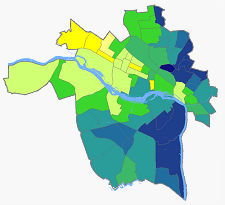Sign up for the monthly RVAgreen 2050 newsletter here.
Call us at (804) 646-6957
Email us at rvagreen@rva.gov
Climate is the long-term weather pattern in a region, and it is changing across the world. Research and data show that land surface temperature, sea-surface temperature and sea level have dramatically increased while snow cover and sea ice extent have decreased over the past 100 years.

What is causing climate change?
The current changing climate is linked to rising concentrations of greenhouse gases such as carbon dioxide, methane and hydrofluorocarbons in the atmosphere, which insulate the planet and cause it to warm. Greenhouse gases have been released through both natural processes and human activities such as livestock raising and burning fossil fuels. Due to decades of burning fossil fuels and other activities, dangerous amounts of greenhouse gases are now in the atmosphere and are disrupting Earth’s climate.
Global climate change has already had observable negative effects. Glaciers have shrunk, ice on rivers and lakes is breaking up earlier and animal habitats have shifted. Effects that scientists in the past had predicted would result from global climate change are now occurring: loss of sea ice, accelerated sea level rise and longer, more intense heat waves.
How is climate change affecting Richmond?
The impacts of climate change vary by location. Some areas of the country experience more droughts and forest fires. Richmond faces hotter temperatures, extended heat waves and more extreme rain events. These impacts are projected to increase in the future, in addition to the impacts of a future with sea level rise.

These changes in Richmond’s climate will have potentially severe impacts on residents, the community and government. These impacts could include injury and illness, property damage and loss, service delivery delay or disruption and a strain on financial resources.
The impacts of climate change will affect some members of our community more than others. This is because various social and biological factors can cause some people to have increased sensitivity to climate change.


For these reasons, it is critical that the City of Richmond’s efforts to address climate change are carried out in a way that is inclusive of and protects our most vulnerable communities. Read more.
RVAgreen 2050 Climate Equity Index
As an input to the RVAgreen 2050 planning process, the City of Richmond conducted an assessment of the vulnerability of Richmond’s residents, built assets, and natural resources to the climate impacts of extreme heat, extreme precipitation, and future sea level rise. Climate change affects some members of our community more than others based on several root causes and social and biological factors, many of which can be explored using this tool. This Climate Equity Index is being used to identify and engage Richmond’s frontline communities.
Climate change will affect, and already is affecting, human physical and mental health. The climate impacts affecting Richmond - extreme heat, extreme precipitation, and sea level rise - will cause new health problems and worsen existing ones.

Climate Change and Health, Fourth National Climate Assessment
Health threats could include extreme heat, poor air quality and changes in bacteria, viruses and other infectious agents. Extreme events, such as heavy rainfall, can also disrupt critical services such as healthcare and public safety.
Climate-related health stressors will impact some members of our community more than others. This is because various factors can cause some people to have increased sensitivity to climate change. For example, people living in urban areas with less green space and tree canopy may be exposed to higher temperatures because of the urban heat island effect. In addition, people with preexisting health conditions such as cardiovascular and respiratory illnesses may be more at risk of heat-related illness. For these reasons, it is critical that the City of Richmond’s efforts to address climate change are carried out in a way that is inclusive of and protects our most vulnerable communities. Read more.



